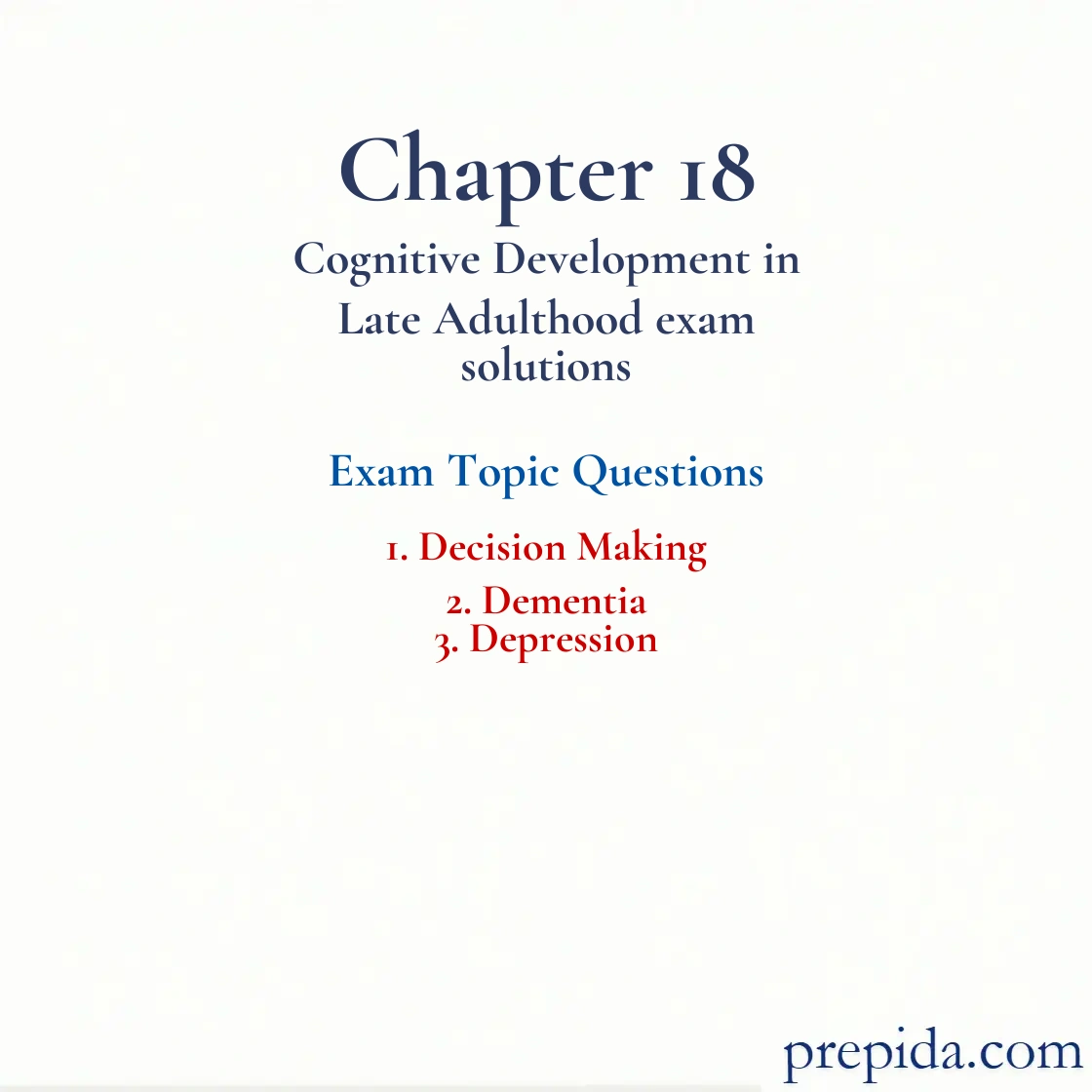
Which of the following is true of decision making and aging?
- Older adults perform well when decision making is constrained by time pressures.
- Older adults are far more inconsistent in their choices compared with younger adults.
- Older adults perform well when decisions involve high risks.
- Older adults' decision-making skills are more likely to be unaffected by age-related decreases in memory.
Ageism: Prejudice against others because of their age, especially prejudice against older adults.
Older adults especially perform well when decision making
- is not constrained by time pressures.
- does not hold any meaning for them.
- involves high risks.
- requires high perceptual speed.
Sustained Attention: Focused and extended engagement with an object, task, event, or other aspect of the environment.
According to the Alzheimer's Association, individuals who are ________ years or older are at risk for developing dementia.
- 65
- 55
- 75
- 85
Memory: A central feature of cognitive development, pertaining to all situations in which an individual retains information over time.
According to a study by Balasubramaniam in 2018, who among the following is most likely to commit suicide?
- a male who lives alone
- a male who travels frequently
- a male who lives with his spouse
- a male who changes jobs frequently
________ is the global term for any neurological disorder in which the primary symptoms involve a deterioration of mental functioning.
- Paranoia
- Dementia
- Schizophrenia
- Alzheimer disease
Alzheimer Disease: A progressive, irreversible brain disorder characterized by a gradual deterioration of memory, reasoning, language, and eventually, physical function.
According to a study conducted by Schieman, van Gundy, and Taylor, the lower frequency of depressive symptoms in older adults compared with middle-aged adults was linked to
- fewer economic hardships.
- regular physical activity.
- frequent negative social interchanges.
- decreased religiosity.
Which of the following is an individual with major depression likely to experience?
- inability to recognize familiar people
- deterioration of reasoning and language
- self-derogatory thoughts
- increased appetite
Major Depression: A mood disorder in which the individual is deeply unhappy, demoralized, self-derogatory, and bored. The person does not feel well, loses stamina easily, has poor appetite, and is listless and unmotivated. Major depression is so widespread that it has been called the “common cold” of mental disorders.
Which of the following is called the "common cold" of mental disorders?
- schizophrenia
- alzheimer disease
- tip-of-the-tongue phenomenon
- major depression
Major Depression: A mood disorder in which the individual is deeply unhappy, demoralized, self-derogatory, and bored. The person does not feel well, loses stamina easily, has poor appetite, and is listless and unmotivated. Major depression is so widespread that it has been called the “common cold” of mental disorders.
Which of the following is true of research findings on depression in older adults?
- Insomnia is not a risk factor for depression in older adults.
- Suicidal ideation is strongly associated with depression severity in older adults.
- Living in an institutionalized setting is linked to decreased risk for depression in older adults.
- Community-dwelling older adults who use a computer exhibit a high level of depressive symptoms.
Major Depression: A mood disorder in which the individual is deeply unhappy, demoralized, self-derogatory, and bored. The person does not feel well, loses stamina easily, has poor appetite, and is listless and unmotivated. Major depression is so widespread that it has been called the “common cold” of mental disorders.
According to a study by Dols and others, which of the following is more effective in treating older adults' depression than antidepressants?
- existential therapy
- ecological counseling
- adlerian therapy
- electroconvulsive treatment
Which of the following is a factor that contributes to suicidal ideation?
- high self-worth
- comfort from religion
- physical discomfort
- emotional control
Pain Cry: A sudden appearance of a long, initial loud cry without preliminary moaning, followed by breath holding.
A person with ________ does not feel well, loses stamina easily, has a poor appetite, and is listless and unmotivated.
- obsessive compulsive disorder
- schizophrenia
- dementia
- major depression
Which of the following is one of the most common predictors of depression in older adults?
- excessive sleep
- low social support
- high social participation
- delayed marriage